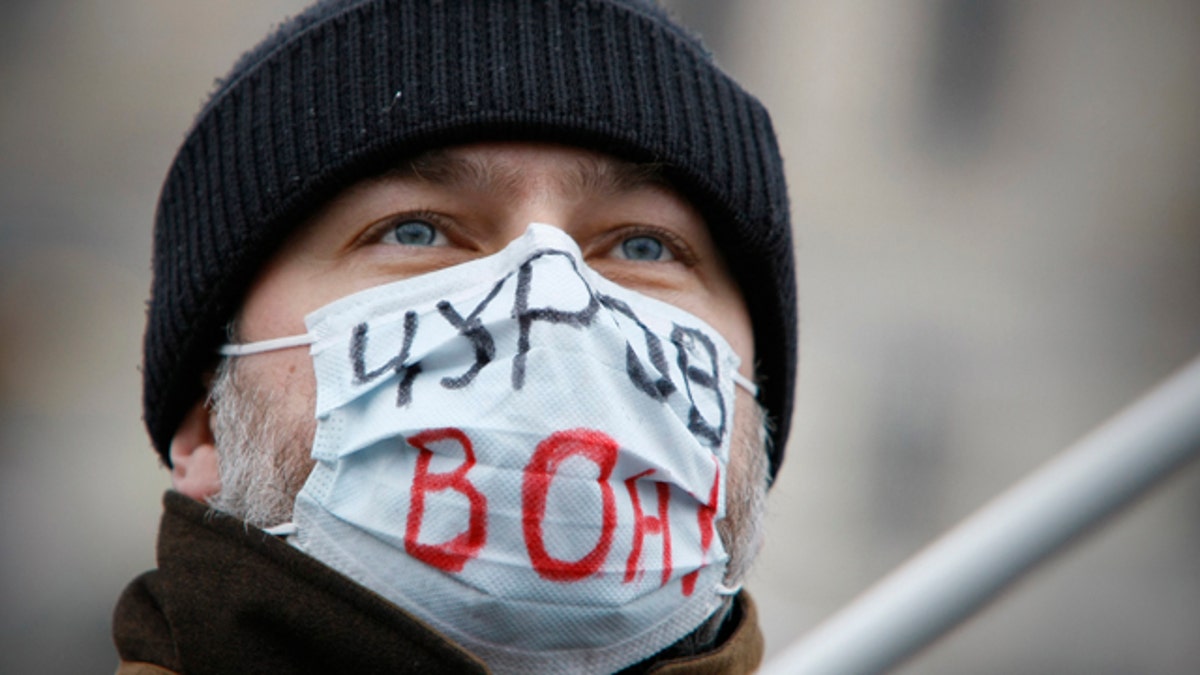
Dec. 11: A masked protesterwith the words 'Central Election Commission chief Vladimir Churov is a thief' during their rally at Bolotnaya Square, on an island in the Moscow River adjacent to the Kremlin. (AP)
MOSCOW – The owner of Russia's top media holding company fired an editor and a senior manager on Tuesday over what he described as an "ethical breach," but some media rights activists and journalists described it an attempt to muzzle criticism of alleged vote fraud during this month's national election.
The owner, Alisher Usmanov, one of Russia's richest men, didn't provide details about what had happened, but the editor said he was probably fired because of a photograph his weekly published that contained vulgar words aimed at Prime Minister Vladimir Putin.
Media coverage of alleged voter fraud in the Dec. 4 parliamentary election has led to Russia's largest anti-government protests in a decade. The vote also saw a sharp drop in support for Putin's United Russia party.
Usmanov, whose fortune has been estimated at $17.7 billion by Forbes magazine, used a website of his company to announce that Maxim Kovalsky, an editor at the Kommersant Vlast weekly, and Andrei Galiyev, a director of ZAO Kommersant-Holding, have been dismissed.
Kommersant Vlast's scathing headlines and copy about the alleged vote fraud helped make its reports about the election particularly stinging. Kovalsky, who has edited the magazine since 1999, has turned it into the nation's most popular news weekly.
The magazine and the daily Kommersant newspaper, the nation's leading business daily, are a must-read for Russia's political class and its economic elite, and they have long been considered the nation's most stable and high-quality publications.
Usmanov, a metals tycoon, explained his decision by saying that some recent reports in Kommersant Vlast "bordered on petty hooliganism," but didn't elaborate.
Kovalsky said on Ekho Moskvy radio that he was told the reason for his ouster was a photograph of a ballot containing obscene words directed at Putin. Kovalsky said he published the photo, even though he knew it might anger the owner. "We are serving the readers and not the bosses," the editor said.
Demyan Kudryavtsev, the head of the Kommersant Publishing House, took the blame, saying on his blog that the issue of Kommersant Vlast had been published "in violation of internal procedures, professional journalistic standards and the Russian law." He apologized to the readers on his blog and said he had submitted his own resignation.
But Nadezhda Azhgihina, executive secretary of the Russian Union of Journalists, described Usmanov's move as censorship. "We are shocked. It's a clear example of censorship from the owner, a Russian oligarch, who just threw away the general manager and the chief editor of Kommersant Vlast magazine," she told The Associated Press.
Vsevolod Bogdanov, the union's chairman, also described Usmonov's move as a "clear evidence of censorship," according to the RIA Novosti news agency.
Alexei Venediktov, Ekho Moskvy radio's head, expressed regret about Usmanov's move and called it politically driven.
Veronika Kutsillo, a deputy editor of Kommersant Vlast, said Usmanov had previously expressed criticism of the magazine's contents. She said she also submitted her resignation on Tuesday after nearly 20 years with the company.
Putin's 12-year rule has seen the state taking control of all nationwide television networks, which give blanket positive coverage to him and other top officials.
Some of the print media have managed to retain their independence and have been critical of the government, but they also have faced pressure from owners fearing their business interests could suffer because of the criticism.
Tuesday's firings and resignations are not the first in recent weeks at Kommersant Publishing House.
In late November, a deputy editor of the Gazeta.ru online newspaper, was pressured to resign over a map of pre-election violations compiled by Golos, the country's only independent election monitoring group.
